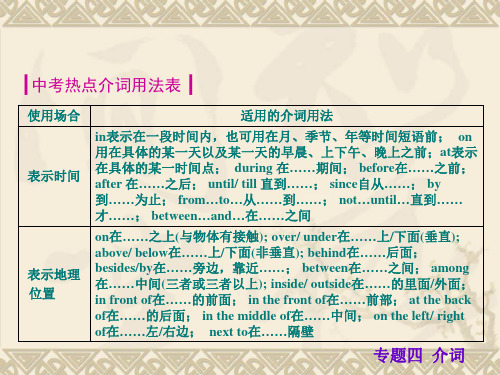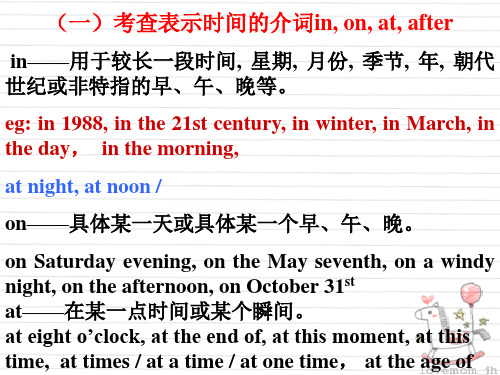初中英语语法表示时间的介词课件
合集下载
表示时间介词用法课件

03
当前周、月的介词用法
在表示当前周、月等时间段时,通常使用介词"this"。例如,"this
week"表示这个星期这个时间段内,"this month"表示这个月这个时间
段内。
表示未来的时间段
未来的时间段介词用法
未来日期的介词用法
未来笼统日期的介词用法
在表示未来的时间段时,常用的介词有"in"、 "after"、"by"。例如,"in three days"表示在 三天后这个时间段内,"after next week"表示 在下周之后这个时间段内,"by the end of this year"表示到今年年底这个时间段内。
笼统日期的介词用法
在表示某个世纪、某个年代、某个季节等笼统的时间段时,通常使用介词"in"。例如,"in the 21st century"表示在21世纪这个时间段内,"in the 1990s"表示在20世纪90年代这 个时间段内,"in spring"表示在春季这个时间段内。
表示现在的时间段
01 02
02
时间介词在句子中通常位于动词 之前,用来描述动作发生的时间 点或时间段。
时间介词的分类
按照功能分类
时间介词可以分为表示时间点、 时间段和时间范围的介词。
按照形式分类
时间介词可以分为简单介词和复 合介词。
时间介词的作用描述动作发生的ຫໍສະໝຸດ 间点或时间段表达时间先后关系
时间介词可以用来描述动作发生的确切时 间,如“在早上”、“在下午”、“在晚 上”等。
17_初中英语语法专题七:-介词ppt课件

I have another blue pen besides this one.
除了这支,我还有一支蓝色钢笔。(共2支 )
We all passed the exam except Tom.
除了汤姆,我们都通过了考试。(汤姆不合格)
14
Part2 : 易混淆介词
15
Part3 : 介词固定搭配
on Monday on Feb.1st,2020
on Teachers' Day on a cold morning on the morning ofMay,10th
at 7:00 at the age of 18
at noon at night
3
总结:
习惯用法:in the future,on holidays, at first,at Christma4 s
9
2.方位介词:Prepositions of place
10
3.运动介词:Prepositions of movement up
over
through 穿过空间
down
across 穿过平面
around
11
The visitors went through a big gate into another park. They climbed over the mountain and arrived there. He can swim across the river.
积累
be
16
Summary
17
Zhenjian is on the north of Fujian.
接壤
7
2.方位介词:Prepositions of place
除了这支,我还有一支蓝色钢笔。(共2支 )
We all passed the exam except Tom.
除了汤姆,我们都通过了考试。(汤姆不合格)
14
Part2 : 易混淆介词
15
Part3 : 介词固定搭配
on Monday on Feb.1st,2020
on Teachers' Day on a cold morning on the morning ofMay,10th
at 7:00 at the age of 18
at noon at night
3
总结:
习惯用法:in the future,on holidays, at first,at Christma4 s
9
2.方位介词:Prepositions of place
10
3.运动介词:Prepositions of movement up
over
through 穿过空间
down
across 穿过平面
around
11
The visitors went through a big gate into another park. They climbed over the mountain and arrived there. He can swim across the river.
积累
be
16
Summary
17
Zhenjian is on the north of Fujian.
接壤
7
2.方位介词:Prepositions of place
介词(19张PPT)初中英语专项复习课件

The teacher is sitting in the front of the classroom. 老师正坐在教室前部。
(五)at 与in at与较小的地点连用,in与较大的地点连用。如: He arrived at school at 8 o'clock. 他八点到达学校。 He arrived in Paris yesterday. 他昨天到达巴黎。
(三)be+形容词+介词 be born in…出生于…… be good at…擅长…… be made of…由……制成 be angry with sb.跟某人生气 be angry at sth.为某事生气 be pleased with sb.对某人感到满意 be satisfied with sth.对某事感到满意 be surprised at… 对……感到惊奇(诧异)
They walked through the forest. 他们穿过森林。
(四)in front of与in the front of in front of 表示“在某人或某物的前面”,在某个范围以外; in the front of 表示“在……的前部”,在某个范围以内。如: There are some tall trees in front of the building. 这座楼前面有一些高高的树木。
(二)介词+名词 in time 及时 on time 准时 at home 在家 in English 用英语 at night 在晚上 with a smile 带着微笑 without breakfast 没吃早餐 at first 首先 at last 最后
on one's way to… 在某人去……的路上 at once 立刻,马上 at the same time 同时 by hand 手工,亲手 in trouble 处于困境 in fact 事实上 on duty 值日 on the left/right 在左/右边 to one's surprise 令某人吃惊的是
(五)at 与in at与较小的地点连用,in与较大的地点连用。如: He arrived at school at 8 o'clock. 他八点到达学校。 He arrived in Paris yesterday. 他昨天到达巴黎。
(三)be+形容词+介词 be born in…出生于…… be good at…擅长…… be made of…由……制成 be angry with sb.跟某人生气 be angry at sth.为某事生气 be pleased with sb.对某人感到满意 be satisfied with sth.对某事感到满意 be surprised at… 对……感到惊奇(诧异)
They walked through the forest. 他们穿过森林。
(四)in front of与in the front of in front of 表示“在某人或某物的前面”,在某个范围以外; in the front of 表示“在……的前部”,在某个范围以内。如: There are some tall trees in front of the building. 这座楼前面有一些高高的树木。
(二)介词+名词 in time 及时 on time 准时 at home 在家 in English 用英语 at night 在晚上 with a smile 带着微笑 without breakfast 没吃早餐 at first 首先 at last 最后
on one's way to… 在某人去……的路上 at once 立刻,马上 at the same time 同时 by hand 手工,亲手 in trouble 处于困境 in fact 事实上 on duty 值日 on the left/right 在左/右边 to one's surprise 令某人吃惊的是
介词(37张PPT)初中英语专项复习课件

常+时间点
before
He must be back home before 10
介词
till/until
用法
表示“到……为止;直至”。
举例
He didn’t leave the office until 12 o’clock. (非延续性动词) Let’s stay here till tomorrow. (延续性动词)
she decided to do. 她知道, 无论她决定做什么,她的家人肯定会支持她。
妙辨异同:in front of/in the front of/in front
in front of:表示“在……前面”, 为介词短语, 指在某人/物体前 面。
in the front of:表示“在……前部”,为介词短语,指在某一物体 内部的前面。
above 表示“在……上方; 在……之上”,不一定在正上方,反义词为
below; over 表示“在……的上方”,强调位于物体正上方,反义词为under(两个 物体间有接触或无接触); on 表示“在……上”,强调两个物体间有接触; against 表示“倚; 靠; 撞”。
A plane is flying above us. I could hear the noise in the yard below my window. There are many books on the shelf. There is a bridge over the river. There is a ball under the teacher’s desk. Bob sat down against a tree.
in front:表示“在前面”,为副词短语。walk in front 走在前面
介词(33张PPT)初中英语专项复习课件

4. 表示“附近”“对面”的方位介词
附近
near next to
对面
opposite
距离近 与……紧挨着
在……对面
习惯上作表语, 不作定语
其后接名词或代 词,不作表语
与 across from 同 义
His house is very near. 他的家很近。 May I bring my chair next to yours? 我可以把我的椅子移到你的旁边吗? Our school is opposite a bank. 我们的学校在一家银行的对面。
below
在……下面 在(或到) ……下面
表示前者在后者的垂直 下方,二者不接触
表示前者在后者的下方, 但不一定垂直,二者不接
触
【图解助记】
He put his watch on the desk. 他把他的手表放在桌子上。 The bird is flying above my head. 这只鸟在我的头上飞。 There is a bridge over the river. 河上有一座桥。 There is a cat under the table. 有一只猫在桌子底下。 Please write your name below the line. 请把你的名字写在线下。
求
be used to 习惯于
be worried about 为……感到 担心
4. “介词+名词+介词”的搭配
at the foot of 在……脚下 in the middle of 在……中间
on the top of 在……顶端 in the east of 在……东部
易错盘点 易错提示:in/on/to表方位
初一英语语法——介词(共11张PPT)

指在某个物体的空间内穿过,如穿过“隧道、桥洞”等
through
The bus goes through the tunnel very quickly. 汽车迅速穿过隧道。
四、方式介词
• 表示方式的介词主要有by,with,in等。
– 1.by表示“靠、用”。如: – I go to school by bike.我骑自行车上学。 – 2.with表示“与……一起”或“用……”。如 – I cut the apple with a knife.我用刀切苹果。 – 3.in表示“用某种语言,以某种方式”。 – She can speak in English.她会讲英语。
饭前要洗手。 • after 表示在-----之后 • They often do their homework after school. • 他们经常放学后写作业。
一、时间介词
• From ---- to ---- :表示 从----到---• We go to school from Monday to Friday.
我们从周一到周五上学。
二、方位介词
• 1.on,over和above
相同点
触 There is a cup on the table.桌子上有一个杯子。
不同点
over
表示“在……的正上方”,两个物体的表面没有接触 A bridge is over the river.河上有座桥。
一、时间介词
• On, in, at 都表示时间。但有区别: at 用在时刻和中午的前面,表示具体的时间点 at 6: 00 在6点 at noon 在中午
一、时间介词
• before 和 after 的用法 • before 表示在 ---- 之前 • Wash your hands before meals.
初中英语介词用法ppt课件

A.in;; for
D.in; since
A 考查介词的用法。年、月、日的前面用介词in或on, 其
具体用法为:in 表示在某周、某年或某月;on表示在具体的某
一日。 由下半句“我成为一名团员已经3年了”可知,此处应
是“for +一段时间”,故选A。
专题四 介词
( )3. [2011·烟台] —Can a plane fly ________ the Atlantic Ocean?
( )5. [2012·丽水] People from different parts of the world will go to London ________the Olympic Games this summer.
A.in B.from C.to D.for D for 意为“因为……”,表原因。
表示“除……之外”
except除……之外(不包括在范围之内); besides除……之外 (包括在叙述范围之内); but常与nobody, none, no one,
nothing等词连用
表示“替代” instead of代替
专题四 介词
┃中考透视┃
( )1. [2011·崇左] —Is Jack good at basketball?
专题四 介词
专题四 介词
表示方向
to到……; at向……; for朝……; from从……; off 从……离开, 下来; into进入……; out of从……出来; across从这一边到另一边; through从事物的内部经过; over从……上空越过
by用(方法、手段、途径等)或乘坐(交通工具); in用(方式、
“在……旁边”。根据句意“杰克擅长篮球吗?”“是的,除
英语介词的正确使用方法ppt课件

The bridge is over the river.
The cup is on the table.
(十) of/ to/ for表示事物之间的关系 of --- 所属关系。 如:The door of the room
The friend of my father’s to --- 两物之间的联系 The key to the exercise 这个练习的答案 The key to the door 门的钥匙
in
on
to
(四) across/ through, cross 表示”越过、穿过” cross: 动词“跨过,越过”=go(动词) across across: (表面)跨过 through: (内部)穿过,贯穿 介词 eg. 1)Can you swim __a_c_c_r_o_s_s__ the river?
【拓展考点1】
in+一段时间,表示一段时间之后,与动词将来时 连用。
after则常用于过去时。 比较:He will be back in two days.
He came back after two days. 易错题:
--_______ will the film start?
--In ten minutes.
你的画很好,除了有些颜色不好
• Smith is a good man, _ex_c_e_p_t_fo_r_ his bad temper.
史密斯除了脾气不好外,是个好人。
• The movie was good ___e_x_ce_p_t_f_o_r___ the ending.
这部电影除了结尾之外都很好。
(九) over, above与on表示“在……上”的区别。 over——指没有接触面的正上方, 反义词是under。 above——指没有接触面的上方, 在高一些的位置, 反义词是below。 on——指有接触面的, 在……的表面上。 The plane is above the clouds.
The cup is on the table.
(十) of/ to/ for表示事物之间的关系 of --- 所属关系。 如:The door of the room
The friend of my father’s to --- 两物之间的联系 The key to the exercise 这个练习的答案 The key to the door 门的钥匙
in
on
to
(四) across/ through, cross 表示”越过、穿过” cross: 动词“跨过,越过”=go(动词) across across: (表面)跨过 through: (内部)穿过,贯穿 介词 eg. 1)Can you swim __a_c_c_r_o_s_s__ the river?
【拓展考点1】
in+一段时间,表示一段时间之后,与动词将来时 连用。
after则常用于过去时。 比较:He will be back in two days.
He came back after two days. 易错题:
--_______ will the film start?
--In ten minutes.
你的画很好,除了有些颜色不好
• Smith is a good man, _ex_c_e_p_t_fo_r_ his bad temper.
史密斯除了脾气不好外,是个好人。
• The movie was good ___e_x_ce_p_t_f_o_r___ the ending.
这部电影除了结尾之外都很好。
(九) over, above与on表示“在……上”的区别。 over——指没有接触面的正上方, 反义词是under。 above——指没有接触面的上方, 在高一些的位置, 反义词是below。 on——指有接触面的, 在……的表面上。 The plane is above the clouds.
- 1、下载文档前请自行甄别文档内容的完整性,平台不提供额外的编辑、内容补充、找答案等附加服务。
- 2、"仅部分预览"的文档,不可在线预览部分如存在完整性等问题,可反馈申请退款(可完整预览的文档不适用该条件!)。
- 3、如文档侵犯您的权益,请联系客服反馈,我们会尽快为您处理(人工客服工作时间:9:00-18:30)。
初中英语语法表示时间的介词
We use:
at for a PRECISE TIME
✓at 3 o'clock ✓at sunrise ✓at dinnertime ✓at the moment
✓at 10.30am ✓at bedtime ✓at noon ✓at sunset
I have a meeting at 9am. The shop closes at midnight. Jane went home at lunchtime.
next Tuesday) I go home every Easter. (not at every Easter) We'll call you this evening. (not in this evening)
Prepositions of time
Notice the use of the prepositions of time in and on in these common expressions:
in in the morning in the mornings in the afternoon(s) in the evening(s)
✓in Summer
In England, it often snows in December. Do you think we will go to Jupiter in the future? There should be a lot of progress in the next century.
We use:
on for DAYS and DATES
on Sunday on Tuesdays on 6 March on 25 Dec. 2010
on Sunday on Tuesdays on 6 March on 25 Dec. 2010
Do you work on Mondays? Her birthday is on 20 November. Where will you be on New Year's Day?
We use:
in for MONTHS, YEARS, CENTURIES and LONG PERIODS.
✓in the Summer ✓in the Ice Age ✓in the 1990s ✓in 1990
✓in May
✓in the past/future
✓in the next
century
at Christmas*/Easter I stay with my family at Christmas.
at the same time
We finished the test at the same time.
at present
He's not home at present. Try later.
on on Tuesday morning on Saturday mornings on Sunday afternoons on Monday evening
When we say last, next, every, this we do not also use at, in, on.
I went to London last June. (not in last June) He's coming back next Tuesday. (not on
Notice the use of the preposition of time at in the
following standard expressions:Expr Nhomakorabeassion
Example
at night
The stars shine at night.
at the weekend*
I don't usually work at the weekend.
We use:
at for a PRECISE TIME
✓at 3 o'clock ✓at sunrise ✓at dinnertime ✓at the moment
✓at 10.30am ✓at bedtime ✓at noon ✓at sunset
I have a meeting at 9am. The shop closes at midnight. Jane went home at lunchtime.
next Tuesday) I go home every Easter. (not at every Easter) We'll call you this evening. (not in this evening)
Prepositions of time
Notice the use of the prepositions of time in and on in these common expressions:
in in the morning in the mornings in the afternoon(s) in the evening(s)
✓in Summer
In England, it often snows in December. Do you think we will go to Jupiter in the future? There should be a lot of progress in the next century.
We use:
on for DAYS and DATES
on Sunday on Tuesdays on 6 March on 25 Dec. 2010
on Sunday on Tuesdays on 6 March on 25 Dec. 2010
Do you work on Mondays? Her birthday is on 20 November. Where will you be on New Year's Day?
We use:
in for MONTHS, YEARS, CENTURIES and LONG PERIODS.
✓in the Summer ✓in the Ice Age ✓in the 1990s ✓in 1990
✓in May
✓in the past/future
✓in the next
century
at Christmas*/Easter I stay with my family at Christmas.
at the same time
We finished the test at the same time.
at present
He's not home at present. Try later.
on on Tuesday morning on Saturday mornings on Sunday afternoons on Monday evening
When we say last, next, every, this we do not also use at, in, on.
I went to London last June. (not in last June) He's coming back next Tuesday. (not on
Notice the use of the preposition of time at in the
following standard expressions:Expr Nhomakorabeassion
Example
at night
The stars shine at night.
at the weekend*
I don't usually work at the weekend.
